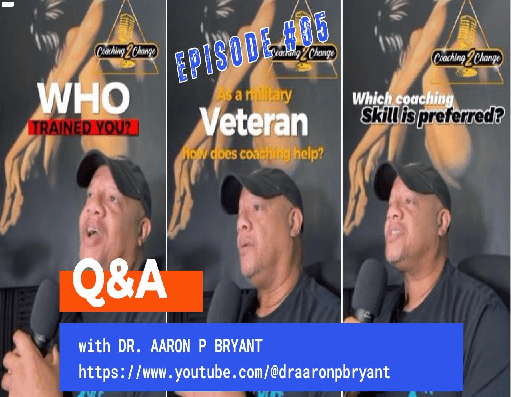Is coaching a necessity, and why?
Coaching isn’t necessary for everyone, but everyone is different, and the situation of any person that may feel they need additional support is always going to look for either an advisor or a consultant. Coaching provides structure, accountability, and personalized strategies that help individuals achieve their goals more effectively. For many, it’s an invaluable resource that offers clarity and direction in navigating life’s challenges.
The thing about a coach is that they are professional advisers, they have the training, they have the background and the skill set to provide that guidance to a person but the unique thing about coaches is that they can do that based on the strengths of that person.
So about it being a necessity, it all depends on the person, some people need coaching and some have that inner strength that can guide them while some people even with that inner strength they still need somebody from the outside to look in.
Therapy vs. coaching? Which do you prefer?
Well, you know I have done both and I could tell you from experience I’m never comfortable with therapy. You have individuals who have all the scholastic background, they have intelligence of literature, that gives them the insight of how we think as people. The problem I have with therapy is that I feel the person, who’s providing the therapy, is using a script if that makes sense, they are provided insight on how a person operates, whereas the coach takes the person for who they are.
In general, the process of coaching is being able to grow and evolve, through information getting to know them, there’s this ongoing evolution. A therapist basically will have you fill out some questionnaires, and hearing you talk , then they basically have this checkpoint of identifying what it is they’re advising you on, because they have these medical books and information that gives you a broad interpretation of what the person is going through.
Therapy and coaching serve different purposes. Therapy is often focused on healing and dealing with past traumas, while coaching is future-oriented, focusing on setting and achieving goals. I prefer coaching because I enjoy helping clients create actionable plans for their future and seeing them achieve their potential.
Which coaching skill is preferred?
If i had to choose which i would probably choose something that provides a
an approach that will identify me as a person and then from there we evolve so for instance if i am a business executive i’m gonna look for a coach who has that skill set of executive coaching. That is great because if that is my goal to improve my performance at work then that coach is gonna work out.
However, what if i have a problem that my performance at work related to something that’s gone on at home can that coach help me with tha, probably not if that’s with their skill set is, this guy could be a thirty year veteran of corporate america but never been married but yet my problem at work is that i’m simply struggling with something that distracting me from work will that person can help me
However if a life coach is the person that i’m working with he or she may have a little broader understanding, not the best at executive coaching, maybe not the best at the marriage coaching, however they can give me a broader perspective as a person so that’s where a life coach goes.
For me developmental coaching is a very broad approach of coaching from ground zero the developmental health as a person and its relates to so many different things but for me as a develop’mental-health coach i’m taken it from perspective of how you’re thinking how your evolving as a person and considering the thinking aspect of it gets a little more specific but again if i had to choose one, a general life coach is probably the best place to start
Why did you become a coach?
I have a very long story but I’m going to give you a short version of it. I became a coach because I got to the point where it was not just related to me wanting to improve who I was as a person, it was more than that, it was about me trying to improve, it was about me trying to understand, it was about me trying to fix.
I had all these different things that was necessary for me to evolve and as i continue to go to therapy as i tended talking to all these experts in the field of psychology, i learned that i had to somehow get out of that rigidness and find somebody or something that would have a little more fluidity to it that would be able to evolve and work with me and improving and coaching was the answer.
So it is just a matter of finding the right coach, it’s a matter of understanding what type of coach is going to be my coach so with all of that it was important for me to recognize that there was definitely a big difference between coaching and psychology. And I guess why I became a coach was simply that the improvement of me gave me the confidence of knowing what I can do to help others. And I also became a coach because I saw how much I was able to achieve and accomplish and therefore for me to be able to basically pay forward I decided to become a coach.
I became a coach because I am devoted to assisting individuals in realizing their potential and achieving their objectives. Seeing someone grow and succeed because of our work together is incredibly fulfilling. Everyone has the capacity for greatness, and I wanted to be a part of that journey for others.
Why did you choose coaching over being a psychologist?
I’m not choosing coaching over psychology. I have been a coach for nine years now and then I’m actually going to become a psychologist, but I think it’s a matter of understanding everything. I don’t want to be somebody who’s critical of a psychologist or psychiatrist or therapist. there’s definitely strength and there’s definitely positivity in all of these different fields there’s definitely a need.
I just have a perspective that coaching gives a certain performance that is a little more dynamic to people, or i should say the others or individuals can have more receptiveness towards coaching, whereas psychology and psychiatry can be a little intimidating very clinical and i think there are a lot of people who don’t really want that, i know as a veteran the idea of going to talk to psychiatrist ,psychologist is not something i’m really intrigued with, most of my vet friends agree with me. Whereas as a coach we can get so much ground that will allow us to cover and yet we can do that with a coach, and there’s a lot of collaboration that goes with coaching, whereas a psychologist or psychiatrist , you don’t have a collaboration.
I chose coaching over psychology because I wanted to focus on goal-setting and future growth rather than primarily dealing with mental health issues and past traumas. Coaching allows me to work with individuals who are generally healthy but want to optimize their lives and reach higher levels of success. I chose to be a coach over a psychologist, but it does not remove me from leveraging the knowledge of our psychologist which is what I’m going to be doing.
As a military veteran, how does coaching help?
I think it has nothing to do with just being a military veteran. I think it just applies to people. Can a military veteran benefit? Absolutely i mean the organization that i’m certified through FIA, Fowler International Academy of professional Coaches. We have a certification relating to veterans in the military.
So i think coaching definitely has a perspective that could contribute to that, but in general it doesn’t matter i mean coaching helps everybody that is requiring any type of support like i mentioned earlier you have realtors i mean real estate brokers, real estate agent, you have actors, you have athletes, you have executives, and so on. An active duty military veteran may be trying to get that next rank. Maybe he or she is trying to figure out how to balance home life with their military service.
As a military veteran, coaching helps by providing an organized method for establishing and accomplishing objectives, similar to the discipline found in the military. It also helps transition to civilian life by offering support, clarity, and a sense of purpose. Coaching helps veterans leverage their unique skills and experiences to succeed in new endeavors.
As an entrepreneur, how does coaching help?
If you’re an entrepreneur that’s by yourself, a coach would be an amazing help to a unit to be able to bounce ideas off kind of think about the choices that you’re making advising on any particular things such as budgets staffing, product development etc. so an entrepreneur definitely should always have a coach with somebody obviously with background in business so they can be able to give them the proper guidance and support related to their particular service
As an entrepreneur, coaching helps by providing an external perspective on business challenges, offering growth strategies, and keeping me accountable for my goals. It also helps me develop leadership skills, manage stress, and effectively balance my personal and professional life.
Who would qualify as a good coach?
I’m hiring coaches all the time and I do not hire anybody that’s under thirty. I don’t feel you have the background, you don’t have the skills set, you don’t have the life experience to be able to coach others.coaching is not something you should do one time it’s something you should really have experience and knowledge in different dynamics.
If you’re Somebody who is a 10-20 years veteran in business can definitely be an entrepreneur type coach, if you’re someone who is an athlete and you’ve played this sport for 20 years plus can be a good coach. Personally, I’m a develop’mental-health coach because I have a long background of mental health awareness, mental health advocacy etc. that’s why I put my emphasis in that,but the developmental part comes from all the life experiences I went through in marriage, divorce, raising kids, working different companies and so on. So me being a developmental health coach is based on my achievements and failures have had through my life experiences.
So qualifying as a good coach all comes back to
- somebody who has the passion to help, you have to want to help other people
- being to have the right skill sets you can’t fake your way of being a coach you need the training of how to deliver the material but you need the background and experience to be able to justify it
A good coach is empathetic, a great listener, and skilled at asking insightful questions. They should be genuinely interested in helping others succeed and possess strong problem-solving skills. Additionally, a good coach should be certified or have significant experience in the coaching field to ensure they provide high-quality guidance.
And i’m going to throw in the fact that communication is important having the ability to be patient having the ability to be aware having ability to listen,these are all factors that are critical to being a good coach
Who trained you?
I’m very lucky, so the organization i mentioned i’m with you know, Fowler International Academy of professional coaches and executive coaching and those that are over thirty years of age will probably remember Sylvan Learning Academy
And the founder the person who created that worldwide business very successful obviously is Berry Fowler he’s the one who created FIA so i was very fortunate to have him provide me my first certification actually provide all my certification
i’m very fortunate to have the founder who was my mentor and person who trained me and therefore that goes into a level of competence and for him to how their faith in me, to be my trainer and my mentor means that there’s something in me and i definitely enjoy the fact that through my success he can look at me almost like a father looking on a son with proudness and been able to know that i’m doing a good job, and every person have helped is because of him.
Why did you create Mastery In Life (M.I.L.)?
Mastery In Life it a passion project and i have an entire vision surrounding it and it critical for me, but why did i create it, is because i feel that it’s a little redundant because i hate to say the fact that there’s already coaching methodology that exists and i understand that, however i felt that there is approach we can take that can keep things a little simpler.
Coaching has become a point where we have different types and we do not always focus on how, there are organizations that will teach you and give you the how.
But that method is not always so easy to interpret and for the client is not always easy to follow so what I did was I created a method that allows the and I’m very careful to say method and not methodology. I want to make that clear, because the methodology is very structured and rigid and follows x y z. I come from a tech background and a good example would be something like SDLC Software or System Development Life Cycle and you have these steps that you go through when you’re implementing a system or software.
You can be able to figure out your next step, based on what you’ve been coaching and that’s where my methods come in, giving that coach the ability to educate you, so you will be able to know how to do, or what to do in the next step. So creating M.I.L which is mastery in life is the whole point of mastery in life being able to take control which is what this next book will be all about, and then everything will be available for them to understand and interpret.
I created Mastery In Life (M.I.L.) to provide a structured, comprehensive framework that simplifies the coaching process and makes it accessible and impactful for everyone. The Mastery in Life Model was developed to address the complexities of personal development and offer a clear path for individuals to achieve their maximum potential.
The Mastery in Life Model was designed to demystify the coaching process, making it straightforward and effective. The Triangle Foundation of Mental Health, Interpersonal Relationships, and Leadership is the bedrock, providing a well-rounded approach to personal growth. The Roadmap of Discovery guides individuals through a transformative journey, ensuring sustained progress and development.
By simplifying the coaching journey into the A.B.C.s of Coaching, the Mastery in Life Model ensures that anyone, regardless of background, can engage in meaningful personal development. This model empowers individuals to take charge of their lives, achieve their goals, and cultivate fulfilling, successful lives.


